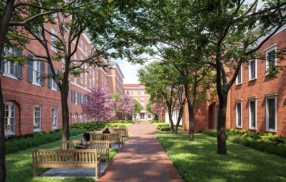
Answering Key Questions About COVID-19 at UVA
By McGregor McCance
With the fall academic semester in full swing, University of Virginia medical experts shared an update on issues related to the COVID-19 pandemic with the University community on Wednesday.
The message addressed questions regarding prevalence testing, vaccination rates, safe gatherings and the likelihood that UVA might either tighten or relax its guidance and practices in the months ahead.
UVA currently requires all people to wear masks when they are indoors, regardless of their vaccination status. The University will monitor conditions and provide another update on its masking policy no later than 1 October.
In the University community message on Wednesday, UVA’s health leaders reminded students and Academic Division faculty and staff that those who are concerned they might be infected but do not have any symptoms, or those who are a close contact with someone who tested positive, can schedule a free saliva-based virus test through the Time2Test scheduling site.
The community update message was delivered by Dr. Christopher P. Holstege, executive director of UVA Student Health and professor of Emergency Medicine and Pediatrics at the School of Medicine; Dr. Mitchell H. Rosner, Henry Mulholland Professor of Medicine and chair of the Department of Medicine; and Dr. Costi D. Sifri, School of Medicine professor and director of Hospital Epidemiology for UVA Health.
“It is important to note the tremendous progress we have made, at UVA and across the country, in the fight against this virus,” the message said. “This time last year, no members of our community were vaccinated against COVID-19, and masks, social distancing, and widespread testing were the most effective tools we had to limit the spread of the disease.”
Today, more than 97 percent of UVA’s student community is fully vaccinated, and more than 93 percent of Academic Division faculty and staff are as well.
“That means an overwhelming majority of our community has powerful protection against contracting COVID-19 and an even better chance of avoiding serious illness or hospitalization. That profound change is an important consideration for the public health approach we are taking this year,” the message said. “We must all continue to take some precautions to limit the spread of the virus, but the vaccines do make it possible to do things that would have been unsafe this time last year. After such a long period of restrictions and limitations, that is good news for all of us as individuals and as a UVA community. It is also a good reason to get vaccinated if you have not yet done so.”
Questions and answers provided in the message, and included below, were drawn directly from questions the health leaders and University have received from across Grounds so far this semester.
Q. What should I do if I have COVID-19 symptoms or am a close contact of someone who tested positive?
A. Our experience thus far has shown that the majority of people experiencing upper respiratory tract symptoms such as a stuffy nose, sore throat and cough do not have COVID-19. It is critical, however, to seek guidance from Student Health or Employee Health experts to guide you on whether COVID-19 testing is needed.
Guidance and resources for students who are symptomatic or close contacts of someone who tested positive are available here.
- Regardless of vaccination status, students who are experiencing symptoms of COVID-19 should self-isolate and schedule a COVID-19 test at Student Health and Wellness online or by calling (434) 924-5362. Students can visit the Student Health and Wellness COVID-19 Testing webpage for more information.
- Close contact guidance:
- Fully vaccinated students who are close contacts of those who test positive for COVID-19 should schedule a COVID-19 test through UVA Be SAFE three to five days after the date they were exposed. Students should wear a mask but do not need to quarantine while awaiting their test result.
- Unvaccinated students who are close contacts should begin quarantine and make an appointment at Student Health and Wellness online or by calling (434) 924-5362.
Employees who are experiencing symptoms or have been in close contact with someone who tested positive should contact Employee Health for further guidance. The U.S. Centers for Disease Control and Prevention also provides useful guidance on when individuals should isolate and when they should quarantine.
Q. Why isn’t the University requiring regular prevalence testing this year for asymptomatic people who are vaccinated?
A. Last year, the University developed a weekly mandatory asymptomatic prevalence testing program for all students in response to the fact that no one in our population was vaccinated and everyone was at equal risk of contracting the virus. That approach helped us identify the risk of widespread transmission among our unvaccinated population.
This year, thanks to high vaccination rates within our community, the overwhelming majority of our population has a low risk of breakthrough infection and an even lower risk of serious illness or hospitalization. For instance, the Virginia Department of Health indicates that, among vaccinated adults, the rate of hospitalization is less than 0.1%. Additionally, a new analysis by the New York Times reports that fully vaccinated people account for just 1 in 5,000 new cases of COVID-19 in the United States.
As a result of the significant shift in risk of serious infection for most members of our community, we have decided to focus our testing resources on the populations where the risk is greatest – unvaccinated people and those who are experiencing symptoms or have been in close contact with an infected person. As always, we are constantly monitoring viral trends and stand ready to change our approach if public health conditions require. As noted above, we also provide testing for asymptomatic employees or students who are concerned about infection. We closely monitor the percentage of positive tests, and this information is available on the UVA COVID Tracker.
Q. Is testing available for people who don’t have symptoms but are concerned that they may have COVID?
A. Yes. As stated above, the University offers testing resources for employees and students who do not have symptoms and have not been a close contact but remain concerned they may have COVID-19. You can schedule a test at no cost through Time2Test. Asymptomatic Academic Division employees can also use Let’s Get Checked kits to test themselves using the instructions listed here.
Q. Have any students become seriously ill or hospitalized with COVID-19 at UVA since the academic year began?
A. No. We have seen some breakthrough cases among vaccinated students, as expected. However, to date, no University students have had serious COVID infections or required hospitalization during the academic year.
Q. Is it safe for vaccinated people to attend social gatherings around lots of unmasked people? Is it safe for unvaccinated people?
A. University public health experts recommend gathering outside as much as possible in order to reduce the risks of spreading COVID-19. However, they do agree with the U.S. Centers for Disease Control and Prevention that fully vaccinated people can gather together indoors when necessary, but they should wear a mask in public areas as much as possible in order to maximize protection from the Delta variant. Unvaccinated people should wear masks any time they are around other people and take extra precautions to avoid crowded spaces or other environments where there is increased risk of transmission.
Q. Is the University witnessing an increase in other illnesses now that people are returning to communal settings?
A. Respiratory illnesses other than COVID-19 have been observed in students and elsewhere in the UVA community. Local daycare centers and elementary schools have reported cases of respiratory syncytial virus (RSV) and rhinovirus (the common cold virus). Infections that are commonly found within the student population are being seen again by clinicians, such as strep throat and mono. As of Sept. 15, no cases of influenza have been observed in University students, faculty or staff. However, we strongly encourage all students, faculty and staff to get their influenza vaccine this year once it’s available.
Q. What is the University looking for in terms of lifting restrictions like the mask mandate? What sorts of things would result in an increase in mitigation measures?
A. Measures that we closely follow include, but are not limited to, COVID-19 case counts among students, faculty and staff; occupancy capacity of isolation and quarantine space; positivity rate for symptomatic and asymptomatic testing; emerging trends discovered through contact tracing; availability of testing supplies; and the local hospital bed capacity. We are following regional, state and national viral trends as well and are alert to the emergence of new variant strains. Finally, we monitor national and state public health guidance and work closely with the Virginia Department of Health in all such decisions.
This story originally appeared on UVA Today.
The University of Virginia Darden School of Business prepares responsible global leaders through unparalleled transformational learning experiences. Darden’s graduate degree programs (MBA, MSBA and Ph.D.) and Executive Education & Lifelong Learning programs offered by the Darden School Foundation set the stage for a lifetime of career advancement and impact. Darden’s top-ranked faculty, renowned for teaching excellence, inspires and shapes modern business leadership worldwide through research, thought leadership and business publishing. Darden has Grounds in Charlottesville, Virginia, and the Washington, D.C., area and a global community that includes 18,000 alumni in 90 countries. Darden was established in 1955 at the University of Virginia, a top public university founded by Thomas Jefferson in 1819 in Charlottesville, Virginia.
Press Contact
Molly Mitchell
Senior Associate Director, Editorial and Media Relations
Darden School of Business
University of Virginia
MitchellM@darden.virginia.edu




